No Sex Allowed and Other Downsides to Growing Old in Early Medieval England
What was it like to grow old in the Middle Ages? Were white hairs a guarantee for respect or were they a pitiable token of endured hardship? Did medieval people long to grow old or did they fear their ever-growing tally of years?
This blog looks at some of the downsides of growing old in early medieval England and identifies some cases of what may be termed ‘gerontophobia’, the fear for old age.
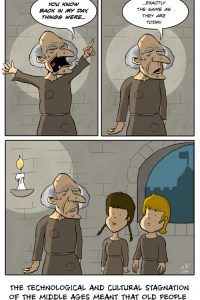

Some misconceptions about medieval old age
Whenever I tell people I have written my PhD thesis on old age in the Middle Ages, a number of misconceptions need to be cleared up first: 1) People did not grow old back then (They did. Theodore of Tarsus (602-690) became archbishop of Canterbury at the age of 67 and remained in office for 21 more years); 2) In the Middle Ages, people were considered old at the age of 40 (No. Texts of the period set the onset of old age around the age of 50); 3) Because there were fewer elderly back then, the senior members of a community were highly respected and revered. This last misconception has found some scholarly support: John Burrow, for instance, maintained that the Anglo-Saxons (the inhabitants of early medieval England) privileged old age above all other age categories.[1] The later Anglo-Saxon period has even been termed “the golden age for the elderly”.[2] This image of early medieval England as an El Dorado for the elderly is one-sided and incomplete. In order to restore some balance to our perception of the appreciation for old age by the Anglo-Saxons, this blog post focuses on some early medieval English texts that deal with the darker sides to old age.
Priestly concerns: Ungodliness and an unabashed sexual appetite
While generally they associated old age with wisdom and piety, early medieval preachers were well aware that senectitude was no guarantee for godly behaviour. In fact, they regularly warned their flock for the senex sine religione, ‘the old man without religion’, along with the rich man without alms and the young man without obedience. [3] Another cautionary figure in Anglo-Saxon homiletic texts is the puer centum annorum, ‘child of a hundred years’. Ælfric of Eynsham (c. 955 – c. 1010), for instance, noted:
"Eft cwæð sum witega, Puer centum annorum maledictus erit: Hundteontigwintre cild byð awyrged. Ðæt is on andgite, Se mann ðe hæfð ylde on gearum, and hæfð cildes þeawas on dysige, þæt se byð awyrged. Ælc treow blewð ær þan þe hit wæstmas bere, and ælc corn bið ærest gærs. Swa eac ælc godes cinnes mann sceal hine sylfne to godnysse awendan, and wisdom lufian, and forlætan idelnysse." [4]
[Again, a certain prophet said: Puer centum annorum maledictus erit (cf. Isa. 65:20): a hundred-year-old child is cursed. That is in the sense: the man who has old age in years, and has the customs of a child in foolishness, let him be cursed. Every tree blooms before it bears fruit, and every grain is first grass. Likewise every man of good pedigree must turn himself to goodness and love wisdom and forsake frivolity.]
Ælfric’s admonition to show behaviour appropriate to one’s age reflects his awareness that some old men persevere in the follies of youth.
A more specific concern of Ælfric’s appears to have been the unabashed sexual appetite of elderly people. In a letter, he classified the sexual needs of an elderly woman as shameful, since intercourse was only meant for procreation:
"Hit byð swyþe sceandlic, þæt eald wif sceole
ceorles brucan, þonne heo forwerod byð
and teames ætealdod, ungehealtsumlice,
forðan ðe gesceafta ne beoð for nanum oðran þinge astealde
butan for bearnteame anum, swa swa us secgað halige bec."[5]
[It is very shameful that an old woman should have sex with a man, when she is worn out with age and too old for childbearing, unchastely, because sexual relations are not meant for any other thing but procreation only, just as holy books tell us.]
Ælfric, it seems, wanted to prevent Anglo-Saxon England from turning into a cougar country!
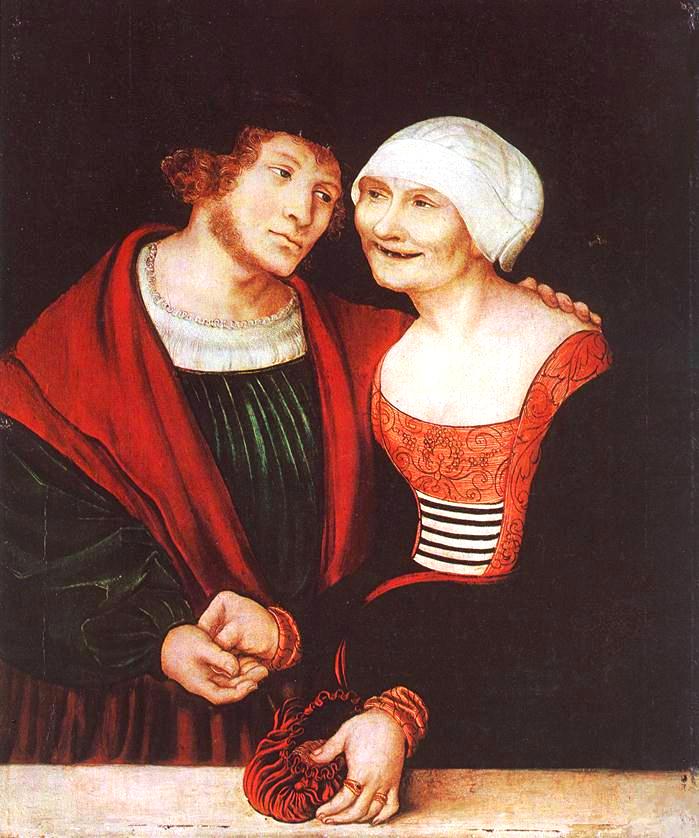
Fig. 3: A medieval ‘cougar’. (Lucas Cranach the Elder, Ill-matched Couple: Young Man and Old Woman (1520-1522) [Public domain; WikiCommons])
While virtuous behaviour was expected of old people, this was by no means a foregone state of affairs. In the end, what mattered was not the age of a man, but his religious devotion, as St. Brendan reassured the young St. Machutus after the latter had expressed doubts as to whether he was worthy of priesthood, given his youth: “Nelle þu þe tweogean forþon þe seo geonglicu eld nænigum ne deraþ gif he fulfremed biþ on his mode. Ne seo ealdlicu eld nænigum ne frameþ gif he biþ on his mode gewemmed” [‘Do not doubt since a young age harms no one if he is virtuous in his heart. Nor does old age benefit anyone if he is corrupt in his heart’].[6]
Memento senescere: The terrors of old age
In the Old English heroic poem Beowulf, the old king Hrothgar warns the young hero Beowulf about all the dangers that await him: fire, floods, swords, spears and, finally, “atol yldo” [terrible old age].[7] Warnings about growing old are also found in Anglo-Saxon homilies, accompanied with vivid descriptions of the physical decay that comes with the years. An anonymous Anglo-Saxon homilist wrote:
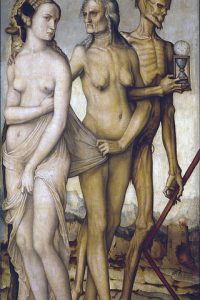

"Him amolsniað and adimmiað þa eagan, þe ær wæron beorhte and gleawe on gesihðe. And seo tunge awistlað, þe ær hæfde getinge spræce and gerade. And ða earan aslawiað, þa þe ær wæron ful swifte and hræde to gehyrenne fægere dreamas and sangas. And þa handa awindað, þa ðe ær hæfdon ful hwæte fingras. And þæt feax afealleð, þe ær wæs fæger on hiwe and on fulre wæstme. And þa teð ageolwiað, þa ðe wæron ær hwite on hiwe. And þæt oreð stincð and afulað, þe ær wæs swete on stence."[8]
[His eyes weaken and become dim, that had been bright and keen of sight. And his tongue hisses, which had possessed fluent and skilful speech. And his ears become sluggish, which had been very swift and quick to hear beautiful stories and songs. And his hands bend, that had possessed fully active fingers. And his hair falls out, that had been fair in colour and in full abundance. And his teeth turn yellow, that had been white in appearance. And his breath, which had been sweet of smell, stinks and turns foul.]
Descriptions like these functioned to remind the audience of the impermanence of worldly pleasures. Just as wealth, joy, friends and status do not last forever, so, too, a man’s youth is not eternal and old age will get him in the end; a memento senescere – remember that you must grow old. The decrepit, aging body was a welcome device that Anglo-Saxon homilists could use to turn their audience’s hopes and minds towards the afterlife; an afterlife, as we shall see below, where old age was either absent or present, depending on whether you would end up in Heaven or Hell.
Heaven is a place without old age: Age in the afterlife
The Venerable Bede (673-735) wrote in his eschatological poem De die iudicii [Concerning Judgement Day] that in Heaven one would enjoy the greatest of joys and no longer suffer “fessa senectus” [wearied old age].[9] Literary representations of the Afterlife often enumerated the celestial joys in combination with the absence of certain horrors that typically included old age. The notion that old age is absent from Heaven regularly occur in Old English sermons; for my PhD thesis, I have identified at least eleven homilies which list “geogoþ butan ylde” [youth without old age] as one of the assets of Heaven, along with light (without darkness), happiness (without sorrow) and health (without sickness). Being generally absent from Heaven, old age was naturally associated with Hell. At least one Anglo-Saxon homilist presented growing old to his flock as one of the “prefiguration” of Hellish torment, along with pain, death, the grave and torture.[10] Want to know what Hell is like? Grow old!
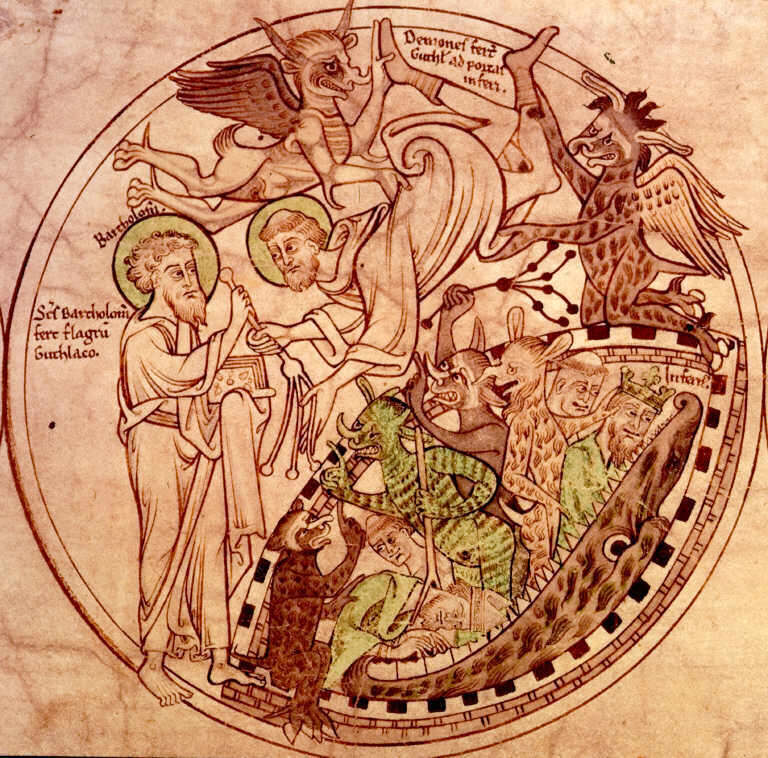
Fig. 5: The Anglo-Saxon saint Guthlac dragged to Hell by demons; note the bearded and wrinkled faces of some of the damned souls. © The British Library, Harley Roll Y.6
Appreciation or apprehension?
"Gehwær is on urum life. ateorung 7 werignys 7 brosnung þæs lichaman: 7 þeahhwæþere wilnað gehwa þæt he lange lybbe. Hwæt is lange lybban buton lange swincan?" [11]
[Everywhere in our life is faintness and weariness, and decay of the body, and yet every one desires that he might live long. What is to live long but to suffer long?]
Why do people want to grow old, Ælfric asks, if all they will get in return is toil and pain? Ælfric’s remark is hard to reconcile with Burrow’s claim that the Anglo-Saxons preferred old age above all other age categories and the notion that the Anglo-Saxon period was ‘a golden age for the elderly’. Not only were the Anglo-Saxons well aware that old age was no guarantee for godly living, they also observed that there were serious downsides to growing old. Anglo-Saxon homilists referred to physical decrepitude in order to remind their audience of the transience of worldly things or to strike the fear of Hell into their hearts. Indeed, one of the alluring aspects of Heaven for an Anglo-Saxon was the absence of old age. Arguably, then, it is more apt to ascribe to the Anglo-Saxons an apprehension for old age, rather than an unequivocal appreciation.
The writing of this blog is one of my last activities as a PhD student, since I will defend my thesis a day after this post will be published. You can read more about my project here, where you will also find a link to a Dutch summary of the thesis. I hope to publish my thesis in due course.
Notes
[1] J. A. Burrow, The Ages of Man: A Study in Medieval Writing and Thought (Oxford, 1986), p. 109.
[2] S. Crawford, ‘Gomol is snoterost: Growing Old in Anglo-Saxon England’, in Collectanea Antiqua: Essays in Memory of Sonia Chadwick Hawkes, ed. M. Henig and T. J. Smith (Oxford, 2007), p. 59.
[3] The senex sine religione often features in a list of the ‘Twelve Abuses’, see Two Ælfric Texts: The Twelve Abuses and The Vices and Virtues, ed. and trans. M. Clayton (Cambridge, 2013), pp. 34–48.
[4] Homilies of Ælfric: A Supplementary Collection, ed. J, C. Pope, EETS os 259–60 (Oxford, 1967–8), hom. 19, ll. 19–25.
[5] Angelsächsische Homilien und Heiligenleben, ed. B. Assmann (Kassel, 1889), hom. 2, ll. 157–61.
[6] The Old English Life of Machutus, ed. D. Yerkes (Toronto, 1984), p. 13, ll. 8–12.
[7] Klaeber’s Beowulf, ed. R. D. Fulk, R. E. Bjork and J. D. Niles, 4th ed. (Toronto, 2008), ll. 1758–68. Hrothgar was speaking from experience, of course; see my article ‘Vergrijzing in een Oudengels heldendicht. De rol van oude koningen in de Beowulf’, Madoc. Tijdschrift over de Middeleeuwen 26 (2012), pp. 66–76
[8] Wulfstan; Sammlung der ihm zugeschriebenen Homilien nebst Untersuchungen über ihre Echtheit, ed. A. S. Napier (Berlin, 1883), hom. 30, p. 147, ll. 23–31, p. 148, ll. 1–7.
[9] Bede, De die iudicii, ed. and trans. G. D. Caie, The Old English Poem Judgement Day II (Cambridge, 2000), l. 129
[10] The Vercelli Homilies and Related Texts, ed. D. G. Scragg, EETS os 300 (London, 1992), hom. 9, ll. 84–5.
[11] Ælfric’s Catholic Homilies: The First Series, ed. P. Clemoes, EETS ss 17 (Oxford, 1997), hom. 32, ll. 213–9.
© Thijs Porck and Leiden Arts in Society Blog, 2016. Unauthorised use and/or duplication of this material without express and written permission from this site’s author and/or owner is strictly prohibited. Excerpts and links may be used, provided that full and clear credit is given to Thijs Porck and Leiden Arts in Society Blog with appropriate and specific direction to the original content.


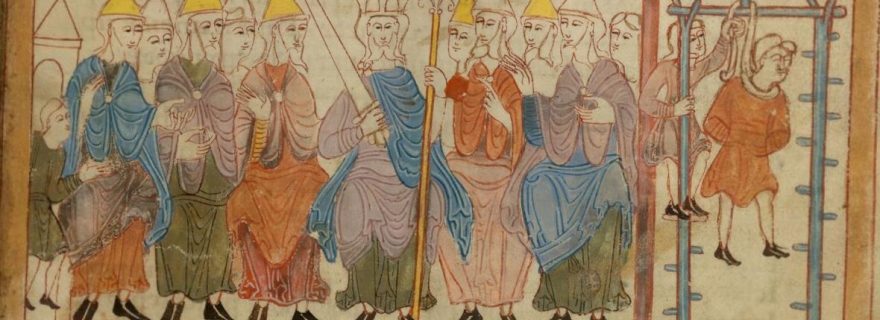
0 Comments